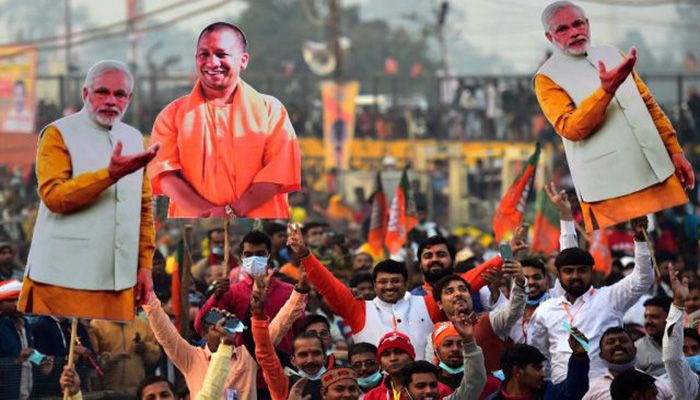
Desk Report
Publish: 11 Mar 2022, 12:06 pm

Photo: Collected
India’s ruling Bharatiya Janata Party has claimed victory in four significant state elections, in a sign of the power of Hindu nationalist politics across the country.
The BJP defied historical precedent and retained power in Uttar Pradesh, India’s most populous and politically significant state with more than 180 million voters. Early results on Thursday showed the party had won at least 266 out of 403 seats, giving it a clear majority.
It was the first win for an incumbent party in the state in more than three decades and ensures the chief minister, Yogi Adityanath, a Hindu monk known for his hardline views, will be the first in the state’s history to remain in power for a second consecutive term.
It secures Adityanath’s status as one of the most powerful figures in the BJP and a potential successor to the prime minister, Narendra Modi, as well as offering a ringing endorsement for the hardline Hindu nationalist agenda that Adityanath has enacted over the past five years.
During his time as chief minister, Adityanath, who dresses in saffron robes and led his own “Hindu army”, often used communal rhetoric seen as targeting Muslims. He banned the slaughter of cows, an animal that is holy to Hindus, and brought in an anti-conversion law to counter “love jihad”, a disproven conspiracy theory that Muslims are forcing Hindu women into marriage in order to convert them to Islam. Journalists and activists were also routinely harassed and charged, and the Uttar Pradesh police have been accused of routinely murdering Muslims and Dalits under Adityanath’s watch.
Utter Pradesh was one of the states hit hardest by the brutal second wave of Covid-19 that engulfed India, with corpses filling up the Ganges River as hospitals and burial grounds become overwhelmed, and the state has one of the highest unemployment rates in India.
But Adityanath’s win has been credited to his development agenda and perceived crackdown on crime, as well as the popularity of Hindu nationalist politics, which is shifting the country away from its secular roots.
Holding on to the bellwether state was seen as essential for the BJP as it built up to the national elections in 2024. Early results showed the party, which has ruled India’s central government since 2014, also held on to power in the states of Uttarakhand, Goa, and Manipur.
In the Uttar Pradesh capital, Lucknow, BJP workers rode bulldozers to the party offices in celebration of their win. In a victory speech, Adityanath told the crowds: “Under Prime Minister Narendra Modi’s leadership, today the BJP won a majority in Uttarakhand, Goa, and Manipur. The voters have blessed Modi’s policies of development and good governance.”
The assembly results have been portrayed as a final nail in the coffin for India’s once formidable National Congress party, the country’s oldest political party and main national opposition for the BJP. On Thursday, it became evident that Congress had lost seats in Goa and Manipur and failed to win back its former stronghold of Punjab, one of the few states where it had still held power. In Uttar Pradesh, it won just a single seat.
“The revolution marches on” was the headline on an editorial in the Indian express newspaper, which called the results “sobering” and added: “It sends a plain and simple message … the BJP simply has no competition.”
Instead, in a victory that could be transformative for India’s future political landscape, it was the relatively new Aam Admi party (AAP), which is in power in Delhi but previously had limited presence outside the capital, that claimed a landslide win in Punjab, where the comedian turned politician Bhagwant Mann will become chief minister.
The Punjab win could set AAP up as a national contender in the 2024 elections, as various regional parties jostle to fill the opposition vacuum left by a weakened Congress.
Congress leaders issued sombre statements following the results. “This is a challenging moment for the Congress party and Punjab most certainly has been a disappointment,” said a party spokesperson, Aadil Singh Boparai.
Rahul Gandhi, the de facto Congress leader, said in a tweet that the party “humbly accept people’s verdict. We’ll learn from this.”
The former government minister Ashwani Kumar, who recently quit the Congress party, described it as a moment of reckoning. “One thing is clear,” he said. “The Gandhi leadership no longer delivers for the Congress.”
Source: The Guardian
Subscribe Shampratik Deshkal Youtube Channel
© 2024 Shampratik Deshkal All Rights Reserved. Design & Developed By Root Soft Bangladesh